Design Thinking Tools: Application in Entrepreneurship Development
VerifiedAdded on 2020/04/01
|19
|4318
|223
Report
AI Summary
This report explores the application of design thinking tools in entrepreneurship, drawing upon personal experiences and workshop learnings. It details various tools like virtualization, customer journey mapping, and rapid prototyping, highlighting their impact on business development. The report emphasizes the importance of understanding consumer behavior and market trends, as well as the iterative process of design thinking, including empathize, define, ideation, prototype, and testing phases. The author discusses the knowledge gained from a workshop, including the learning launch plan and the significance of considering project constraints such as time, cost, and goals. The report concludes with the development of an action plan to implement design thinking tools for entrepreneurial success.
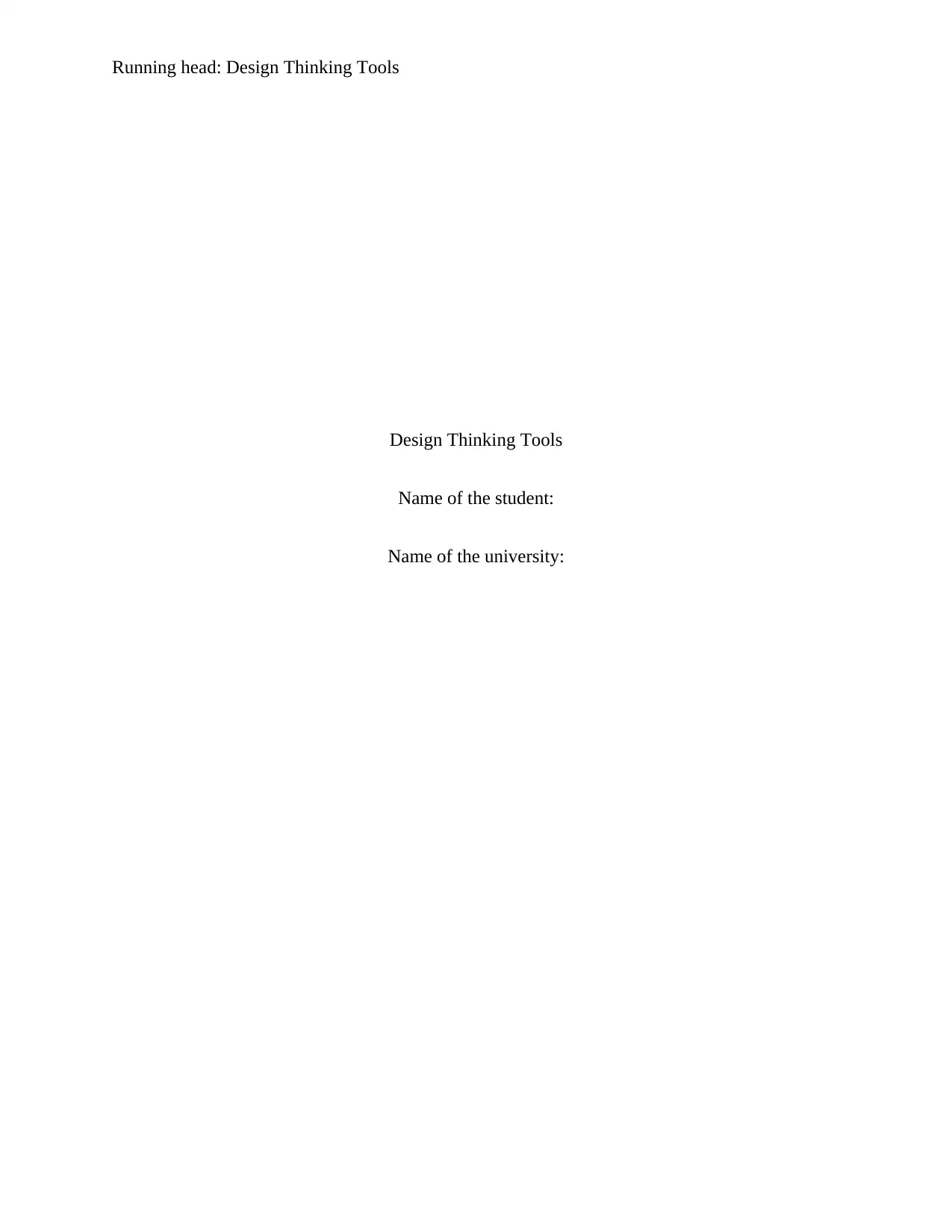
Running head: Design Thinking Tools
Design Thinking Tools
Name of the student:
Name of the university:
Design Thinking Tools
Name of the student:
Name of the university:
Paraphrase This Document
Need a fresh take? Get an instant paraphrase of this document with our AI Paraphraser
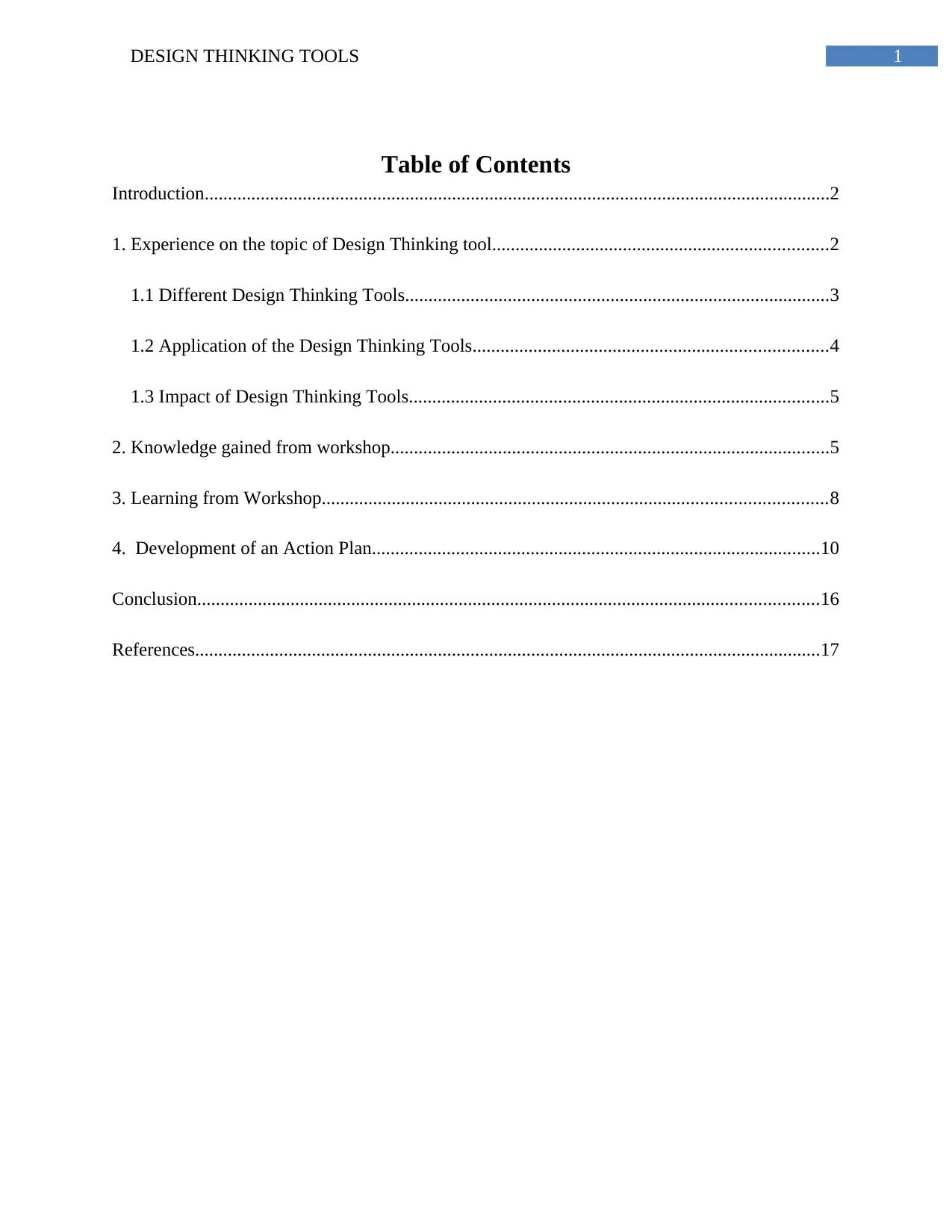
1DESIGN THINKING TOOLS
Table of Contents
Introduction......................................................................................................................................2
1. Experience on the topic of Design Thinking tool........................................................................2
1.1 Different Design Thinking Tools...........................................................................................3
1.2 Application of the Design Thinking Tools............................................................................4
1.3 Impact of Design Thinking Tools..........................................................................................5
2. Knowledge gained from workshop..............................................................................................5
3. Learning from Workshop............................................................................................................8
4. Development of an Action Plan................................................................................................10
Conclusion.....................................................................................................................................16
References......................................................................................................................................17
Table of Contents
Introduction......................................................................................................................................2
1. Experience on the topic of Design Thinking tool........................................................................2
1.1 Different Design Thinking Tools...........................................................................................3
1.2 Application of the Design Thinking Tools............................................................................4
1.3 Impact of Design Thinking Tools..........................................................................................5
2. Knowledge gained from workshop..............................................................................................5
3. Learning from Workshop............................................................................................................8
4. Development of an Action Plan................................................................................................10
Conclusion.....................................................................................................................................16
References......................................................................................................................................17
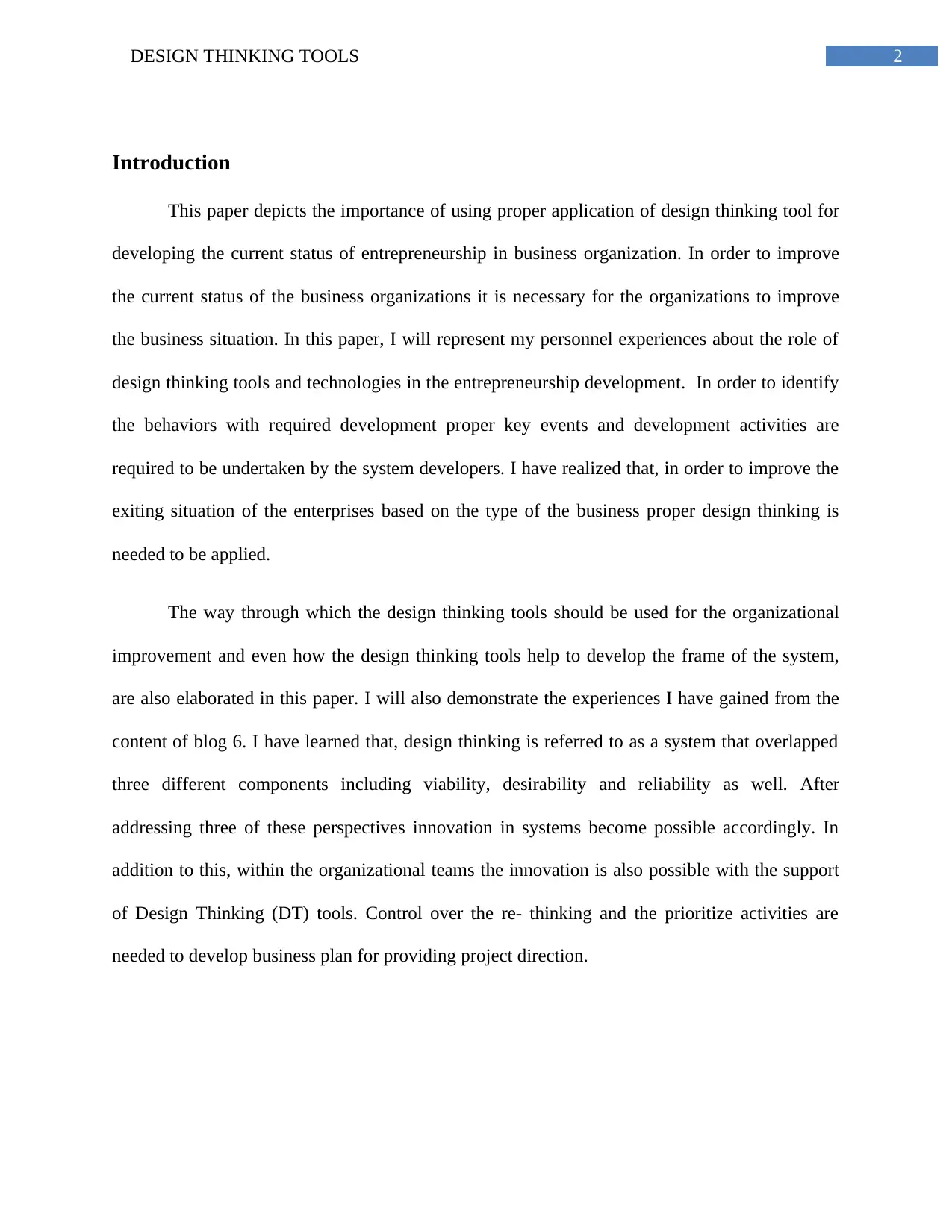
2DESIGN THINKING TOOLS
Introduction
This paper depicts the importance of using proper application of design thinking tool for
developing the current status of entrepreneurship in business organization. In order to improve
the current status of the business organizations it is necessary for the organizations to improve
the business situation. In this paper, I will represent my personnel experiences about the role of
design thinking tools and technologies in the entrepreneurship development. In order to identify
the behaviors with required development proper key events and development activities are
required to be undertaken by the system developers. I have realized that, in order to improve the
exiting situation of the enterprises based on the type of the business proper design thinking is
needed to be applied.
The way through which the design thinking tools should be used for the organizational
improvement and even how the design thinking tools help to develop the frame of the system,
are also elaborated in this paper. I will also demonstrate the experiences I have gained from the
content of blog 6. I have learned that, design thinking is referred to as a system that overlapped
three different components including viability, desirability and reliability as well. After
addressing three of these perspectives innovation in systems become possible accordingly. In
addition to this, within the organizational teams the innovation is also possible with the support
of Design Thinking (DT) tools. Control over the re- thinking and the prioritize activities are
needed to develop business plan for providing project direction.
Introduction
This paper depicts the importance of using proper application of design thinking tool for
developing the current status of entrepreneurship in business organization. In order to improve
the current status of the business organizations it is necessary for the organizations to improve
the business situation. In this paper, I will represent my personnel experiences about the role of
design thinking tools and technologies in the entrepreneurship development. In order to identify
the behaviors with required development proper key events and development activities are
required to be undertaken by the system developers. I have realized that, in order to improve the
exiting situation of the enterprises based on the type of the business proper design thinking is
needed to be applied.
The way through which the design thinking tools should be used for the organizational
improvement and even how the design thinking tools help to develop the frame of the system,
are also elaborated in this paper. I will also demonstrate the experiences I have gained from the
content of blog 6. I have learned that, design thinking is referred to as a system that overlapped
three different components including viability, desirability and reliability as well. After
addressing three of these perspectives innovation in systems become possible accordingly. In
addition to this, within the organizational teams the innovation is also possible with the support
of Design Thinking (DT) tools. Control over the re- thinking and the prioritize activities are
needed to develop business plan for providing project direction.
⊘ This is a preview!⊘
Do you want full access?
Subscribe today to unlock all pages.

Trusted by 1+ million students worldwide
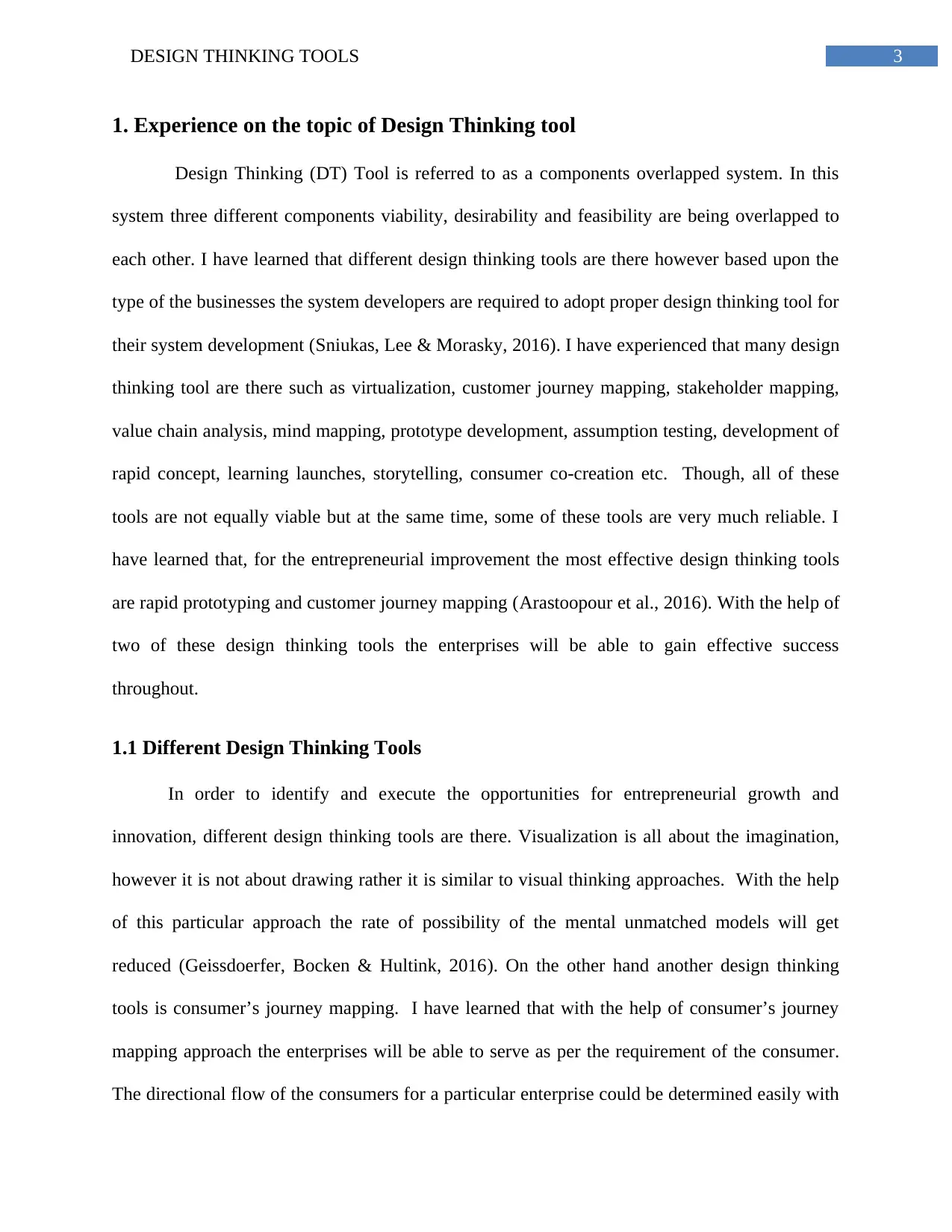
3DESIGN THINKING TOOLS
1. Experience on the topic of Design Thinking tool
Design Thinking (DT) Tool is referred to as a components overlapped system. In this
system three different components viability, desirability and feasibility are being overlapped to
each other. I have learned that different design thinking tools are there however based upon the
type of the businesses the system developers are required to adopt proper design thinking tool for
their system development (Sniukas, Lee & Morasky, 2016). I have experienced that many design
thinking tool are there such as virtualization, customer journey mapping, stakeholder mapping,
value chain analysis, mind mapping, prototype development, assumption testing, development of
rapid concept, learning launches, storytelling, consumer co-creation etc. Though, all of these
tools are not equally viable but at the same time, some of these tools are very much reliable. I
have learned that, for the entrepreneurial improvement the most effective design thinking tools
are rapid prototyping and customer journey mapping (Arastoopour et al., 2016). With the help of
two of these design thinking tools the enterprises will be able to gain effective success
throughout.
1.1 Different Design Thinking Tools
In order to identify and execute the opportunities for entrepreneurial growth and
innovation, different design thinking tools are there. Visualization is all about the imagination,
however it is not about drawing rather it is similar to visual thinking approaches. With the help
of this particular approach the rate of possibility of the mental unmatched models will get
reduced (Geissdoerfer, Bocken & Hultink, 2016). On the other hand another design thinking
tools is consumer’s journey mapping. I have learned that with the help of consumer’s journey
mapping approach the enterprises will be able to serve as per the requirement of the consumer.
The directional flow of the consumers for a particular enterprise could be determined easily with
1. Experience on the topic of Design Thinking tool
Design Thinking (DT) Tool is referred to as a components overlapped system. In this
system three different components viability, desirability and feasibility are being overlapped to
each other. I have learned that different design thinking tools are there however based upon the
type of the businesses the system developers are required to adopt proper design thinking tool for
their system development (Sniukas, Lee & Morasky, 2016). I have experienced that many design
thinking tool are there such as virtualization, customer journey mapping, stakeholder mapping,
value chain analysis, mind mapping, prototype development, assumption testing, development of
rapid concept, learning launches, storytelling, consumer co-creation etc. Though, all of these
tools are not equally viable but at the same time, some of these tools are very much reliable. I
have learned that, for the entrepreneurial improvement the most effective design thinking tools
are rapid prototyping and customer journey mapping (Arastoopour et al., 2016). With the help of
two of these design thinking tools the enterprises will be able to gain effective success
throughout.
1.1 Different Design Thinking Tools
In order to identify and execute the opportunities for entrepreneurial growth and
innovation, different design thinking tools are there. Visualization is all about the imagination,
however it is not about drawing rather it is similar to visual thinking approaches. With the help
of this particular approach the rate of possibility of the mental unmatched models will get
reduced (Geissdoerfer, Bocken & Hultink, 2016). On the other hand another design thinking
tools is consumer’s journey mapping. I have learned that with the help of consumer’s journey
mapping approach the enterprises will be able to serve as per the requirement of the consumer.
The directional flow of the consumers for a particular enterprise could be determined easily with
Paraphrase This Document
Need a fresh take? Get an instant paraphrase of this document with our AI Paraphraser
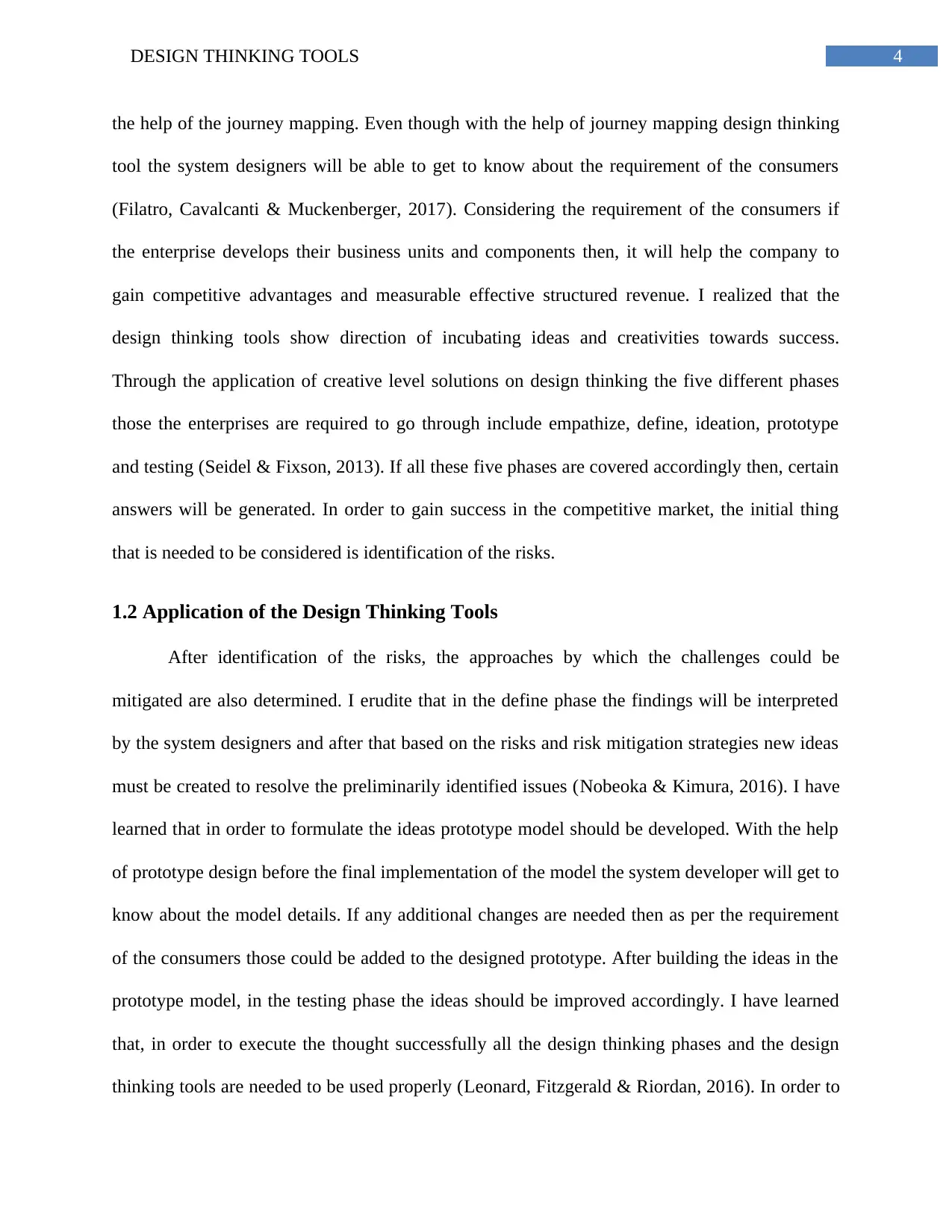
4DESIGN THINKING TOOLS
the help of the journey mapping. Even though with the help of journey mapping design thinking
tool the system designers will be able to get to know about the requirement of the consumers
(Filatro, Cavalcanti & Muckenberger, 2017). Considering the requirement of the consumers if
the enterprise develops their business units and components then, it will help the company to
gain competitive advantages and measurable effective structured revenue. I realized that the
design thinking tools show direction of incubating ideas and creativities towards success.
Through the application of creative level solutions on design thinking the five different phases
those the enterprises are required to go through include empathize, define, ideation, prototype
and testing (Seidel & Fixson, 2013). If all these five phases are covered accordingly then, certain
answers will be generated. In order to gain success in the competitive market, the initial thing
that is needed to be considered is identification of the risks.
1.2 Application of the Design Thinking Tools
After identification of the risks, the approaches by which the challenges could be
mitigated are also determined. I erudite that in the define phase the findings will be interpreted
by the system designers and after that based on the risks and risk mitigation strategies new ideas
must be created to resolve the preliminarily identified issues (Nobeoka & Kimura, 2016). I have
learned that in order to formulate the ideas prototype model should be developed. With the help
of prototype design before the final implementation of the model the system developer will get to
know about the model details. If any additional changes are needed then as per the requirement
of the consumers those could be added to the designed prototype. After building the ideas in the
prototype model, in the testing phase the ideas should be improved accordingly. I have learned
that, in order to execute the thought successfully all the design thinking phases and the design
thinking tools are needed to be used properly (Leonard, Fitzgerald & Riordan, 2016). In order to
the help of the journey mapping. Even though with the help of journey mapping design thinking
tool the system designers will be able to get to know about the requirement of the consumers
(Filatro, Cavalcanti & Muckenberger, 2017). Considering the requirement of the consumers if
the enterprise develops their business units and components then, it will help the company to
gain competitive advantages and measurable effective structured revenue. I realized that the
design thinking tools show direction of incubating ideas and creativities towards success.
Through the application of creative level solutions on design thinking the five different phases
those the enterprises are required to go through include empathize, define, ideation, prototype
and testing (Seidel & Fixson, 2013). If all these five phases are covered accordingly then, certain
answers will be generated. In order to gain success in the competitive market, the initial thing
that is needed to be considered is identification of the risks.
1.2 Application of the Design Thinking Tools
After identification of the risks, the approaches by which the challenges could be
mitigated are also determined. I erudite that in the define phase the findings will be interpreted
by the system designers and after that based on the risks and risk mitigation strategies new ideas
must be created to resolve the preliminarily identified issues (Nobeoka & Kimura, 2016). I have
learned that in order to formulate the ideas prototype model should be developed. With the help
of prototype design before the final implementation of the model the system developer will get to
know about the model details. If any additional changes are needed then as per the requirement
of the consumers those could be added to the designed prototype. After building the ideas in the
prototype model, in the testing phase the ideas should be improved accordingly. I have learned
that, in order to execute the thought successfully all the design thinking phases and the design
thinking tools are needed to be used properly (Leonard, Fitzgerald & Riordan, 2016). In order to
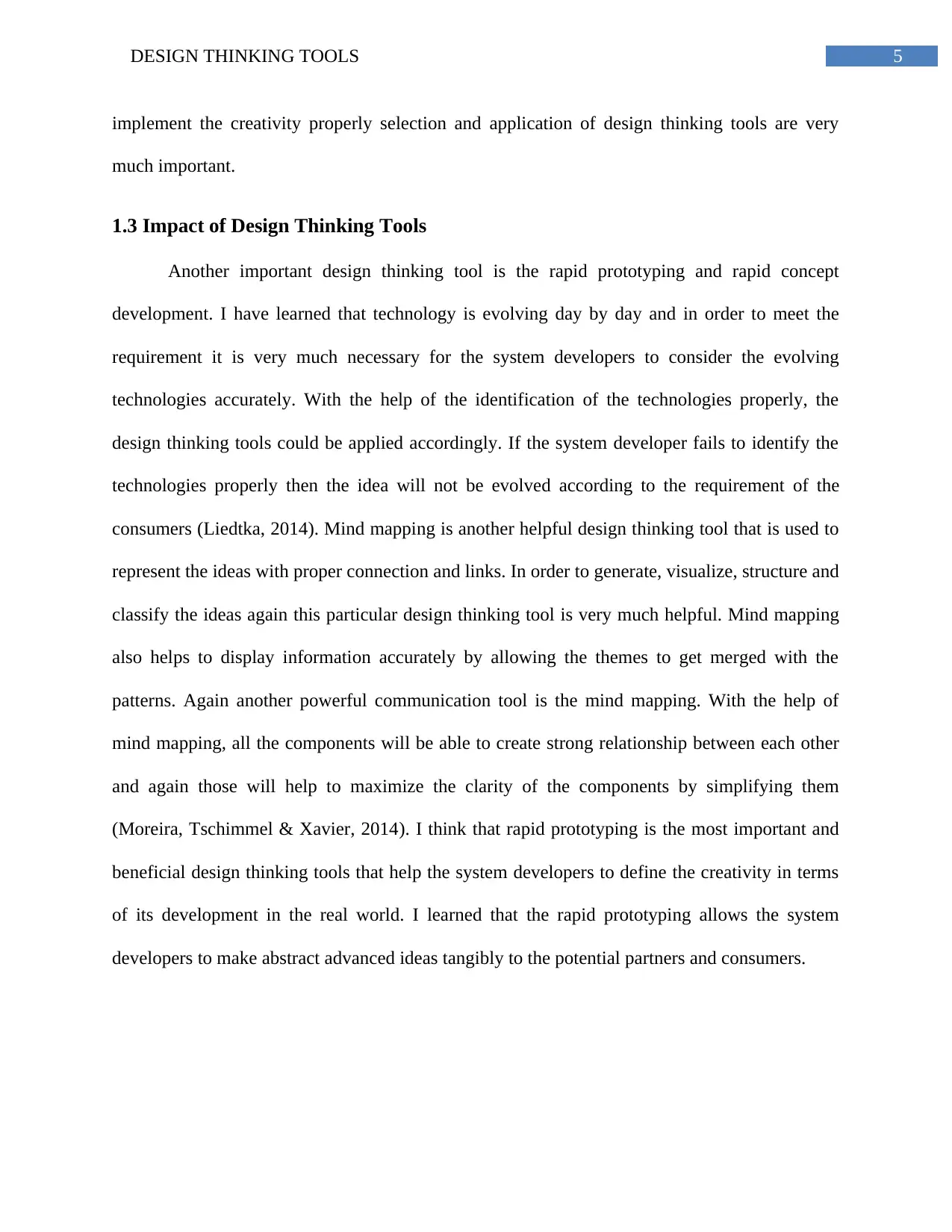
5DESIGN THINKING TOOLS
implement the creativity properly selection and application of design thinking tools are very
much important.
1.3 Impact of Design Thinking Tools
Another important design thinking tool is the rapid prototyping and rapid concept
development. I have learned that technology is evolving day by day and in order to meet the
requirement it is very much necessary for the system developers to consider the evolving
technologies accurately. With the help of the identification of the technologies properly, the
design thinking tools could be applied accordingly. If the system developer fails to identify the
technologies properly then the idea will not be evolved according to the requirement of the
consumers (Liedtka, 2014). Mind mapping is another helpful design thinking tool that is used to
represent the ideas with proper connection and links. In order to generate, visualize, structure and
classify the ideas again this particular design thinking tool is very much helpful. Mind mapping
also helps to display information accurately by allowing the themes to get merged with the
patterns. Again another powerful communication tool is the mind mapping. With the help of
mind mapping, all the components will be able to create strong relationship between each other
and again those will help to maximize the clarity of the components by simplifying them
(Moreira, Tschimmel & Xavier, 2014). I think that rapid prototyping is the most important and
beneficial design thinking tools that help the system developers to define the creativity in terms
of its development in the real world. I learned that the rapid prototyping allows the system
developers to make abstract advanced ideas tangibly to the potential partners and consumers.
implement the creativity properly selection and application of design thinking tools are very
much important.
1.3 Impact of Design Thinking Tools
Another important design thinking tool is the rapid prototyping and rapid concept
development. I have learned that technology is evolving day by day and in order to meet the
requirement it is very much necessary for the system developers to consider the evolving
technologies accurately. With the help of the identification of the technologies properly, the
design thinking tools could be applied accordingly. If the system developer fails to identify the
technologies properly then the idea will not be evolved according to the requirement of the
consumers (Liedtka, 2014). Mind mapping is another helpful design thinking tool that is used to
represent the ideas with proper connection and links. In order to generate, visualize, structure and
classify the ideas again this particular design thinking tool is very much helpful. Mind mapping
also helps to display information accurately by allowing the themes to get merged with the
patterns. Again another powerful communication tool is the mind mapping. With the help of
mind mapping, all the components will be able to create strong relationship between each other
and again those will help to maximize the clarity of the components by simplifying them
(Moreira, Tschimmel & Xavier, 2014). I think that rapid prototyping is the most important and
beneficial design thinking tools that help the system developers to define the creativity in terms
of its development in the real world. I learned that the rapid prototyping allows the system
developers to make abstract advanced ideas tangibly to the potential partners and consumers.
⊘ This is a preview!⊘
Do you want full access?
Subscribe today to unlock all pages.

Trusted by 1+ million students worldwide
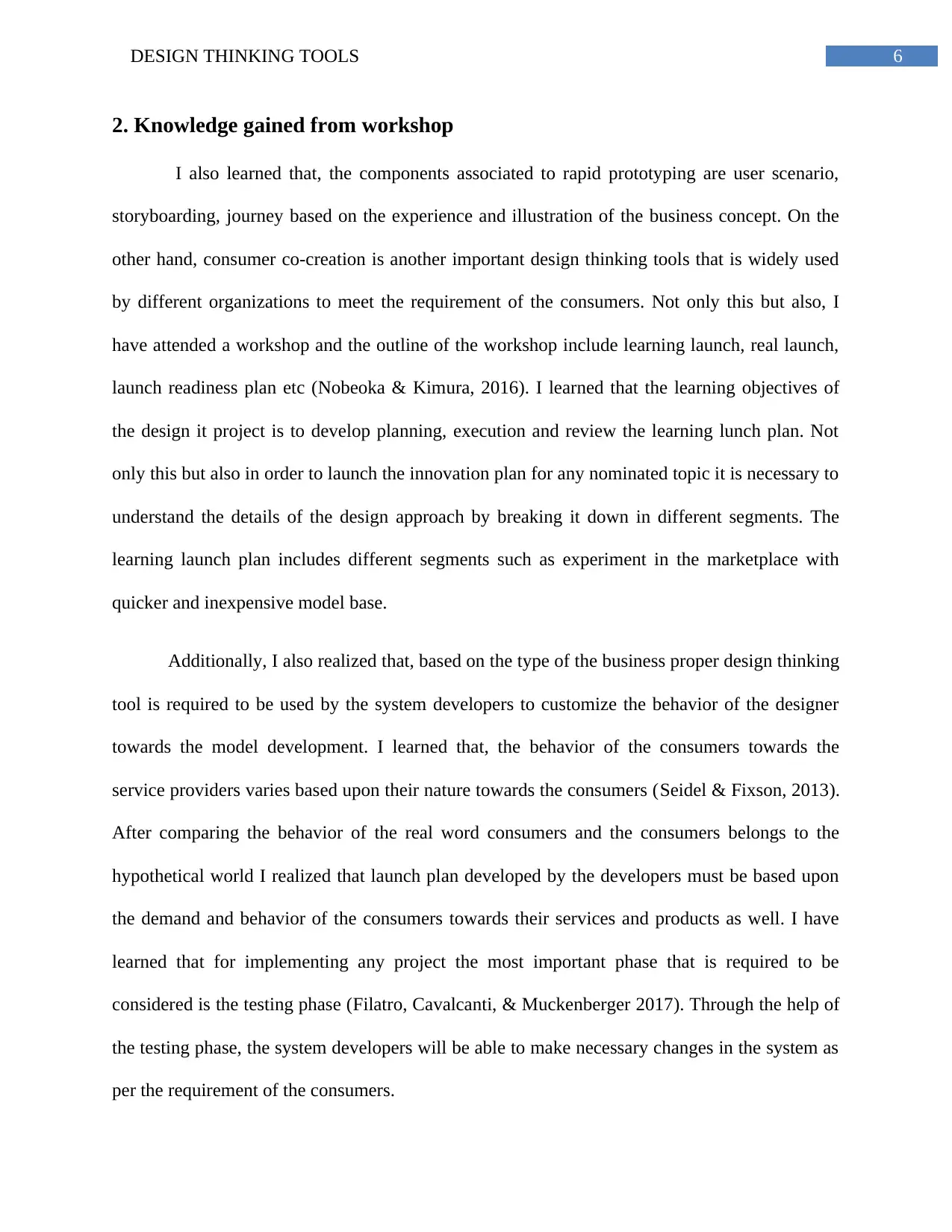
6DESIGN THINKING TOOLS
2. Knowledge gained from workshop
I also learned that, the components associated to rapid prototyping are user scenario,
storyboarding, journey based on the experience and illustration of the business concept. On the
other hand, consumer co-creation is another important design thinking tools that is widely used
by different organizations to meet the requirement of the consumers. Not only this but also, I
have attended a workshop and the outline of the workshop include learning launch, real launch,
launch readiness plan etc (Nobeoka & Kimura, 2016). I learned that the learning objectives of
the design it project is to develop planning, execution and review the learning lunch plan. Not
only this but also in order to launch the innovation plan for any nominated topic it is necessary to
understand the details of the design approach by breaking it down in different segments. The
learning launch plan includes different segments such as experiment in the marketplace with
quicker and inexpensive model base.
Additionally, I also realized that, based on the type of the business proper design thinking
tool is required to be used by the system developers to customize the behavior of the designer
towards the model development. I learned that, the behavior of the consumers towards the
service providers varies based upon their nature towards the consumers (Seidel & Fixson, 2013).
After comparing the behavior of the real word consumers and the consumers belongs to the
hypothetical world I realized that launch plan developed by the developers must be based upon
the demand and behavior of the consumers towards their services and products as well. I have
learned that for implementing any project the most important phase that is required to be
considered is the testing phase (Filatro, Cavalcanti, & Muckenberger 2017). Through the help of
the testing phase, the system developers will be able to make necessary changes in the system as
per the requirement of the consumers.
2. Knowledge gained from workshop
I also learned that, the components associated to rapid prototyping are user scenario,
storyboarding, journey based on the experience and illustration of the business concept. On the
other hand, consumer co-creation is another important design thinking tools that is widely used
by different organizations to meet the requirement of the consumers. Not only this but also, I
have attended a workshop and the outline of the workshop include learning launch, real launch,
launch readiness plan etc (Nobeoka & Kimura, 2016). I learned that the learning objectives of
the design it project is to develop planning, execution and review the learning lunch plan. Not
only this but also in order to launch the innovation plan for any nominated topic it is necessary to
understand the details of the design approach by breaking it down in different segments. The
learning launch plan includes different segments such as experiment in the marketplace with
quicker and inexpensive model base.
Additionally, I also realized that, based on the type of the business proper design thinking
tool is required to be used by the system developers to customize the behavior of the designer
towards the model development. I learned that, the behavior of the consumers towards the
service providers varies based upon their nature towards the consumers (Seidel & Fixson, 2013).
After comparing the behavior of the real word consumers and the consumers belongs to the
hypothetical world I realized that launch plan developed by the developers must be based upon
the demand and behavior of the consumers towards their services and products as well. I have
learned that for implementing any project the most important phase that is required to be
considered is the testing phase (Filatro, Cavalcanti, & Muckenberger 2017). Through the help of
the testing phase, the system developers will be able to make necessary changes in the system as
per the requirement of the consumers.
Paraphrase This Document
Need a fresh take? Get an instant paraphrase of this document with our AI Paraphraser
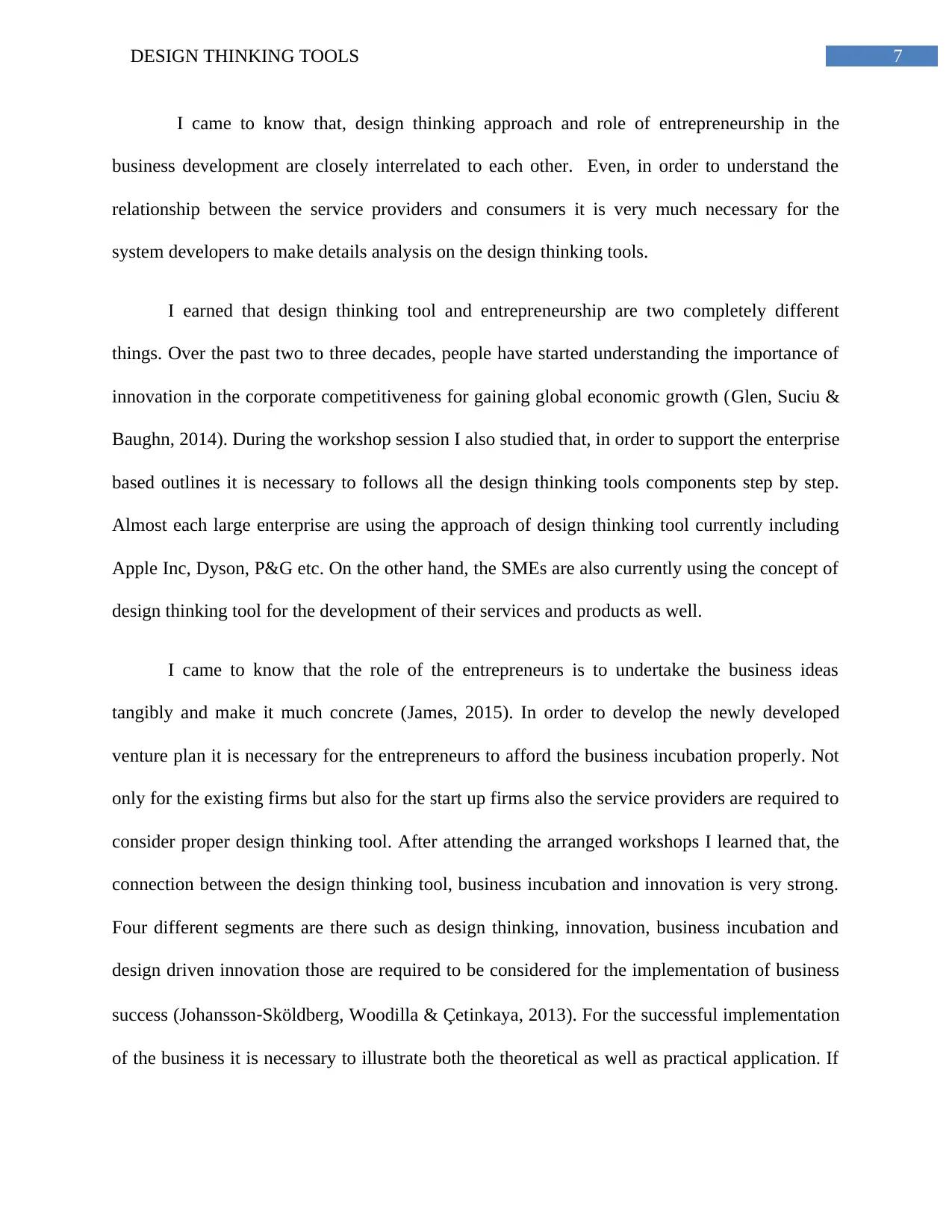
7DESIGN THINKING TOOLS
I came to know that, design thinking approach and role of entrepreneurship in the
business development are closely interrelated to each other. Even, in order to understand the
relationship between the service providers and consumers it is very much necessary for the
system developers to make details analysis on the design thinking tools.
I earned that design thinking tool and entrepreneurship are two completely different
things. Over the past two to three decades, people have started understanding the importance of
innovation in the corporate competitiveness for gaining global economic growth (Glen, Suciu &
Baughn, 2014). During the workshop session I also studied that, in order to support the enterprise
based outlines it is necessary to follows all the design thinking tools components step by step.
Almost each large enterprise are using the approach of design thinking tool currently including
Apple Inc, Dyson, P&G etc. On the other hand, the SMEs are also currently using the concept of
design thinking tool for the development of their services and products as well.
I came to know that the role of the entrepreneurs is to undertake the business ideas
tangibly and make it much concrete (James, 2015). In order to develop the newly developed
venture plan it is necessary for the entrepreneurs to afford the business incubation properly. Not
only for the existing firms but also for the start up firms also the service providers are required to
consider proper design thinking tool. After attending the arranged workshops I learned that, the
connection between the design thinking tool, business incubation and innovation is very strong.
Four different segments are there such as design thinking, innovation, business incubation and
design driven innovation those are required to be considered for the implementation of business
success (Johansson‐Sköldberg, Woodilla & Çetinkaya, 2013). For the successful implementation
of the business it is necessary to illustrate both the theoretical as well as practical application. If
I came to know that, design thinking approach and role of entrepreneurship in the
business development are closely interrelated to each other. Even, in order to understand the
relationship between the service providers and consumers it is very much necessary for the
system developers to make details analysis on the design thinking tools.
I earned that design thinking tool and entrepreneurship are two completely different
things. Over the past two to three decades, people have started understanding the importance of
innovation in the corporate competitiveness for gaining global economic growth (Glen, Suciu &
Baughn, 2014). During the workshop session I also studied that, in order to support the enterprise
based outlines it is necessary to follows all the design thinking tools components step by step.
Almost each large enterprise are using the approach of design thinking tool currently including
Apple Inc, Dyson, P&G etc. On the other hand, the SMEs are also currently using the concept of
design thinking tool for the development of their services and products as well.
I came to know that the role of the entrepreneurs is to undertake the business ideas
tangibly and make it much concrete (James, 2015). In order to develop the newly developed
venture plan it is necessary for the entrepreneurs to afford the business incubation properly. Not
only for the existing firms but also for the start up firms also the service providers are required to
consider proper design thinking tool. After attending the arranged workshops I learned that, the
connection between the design thinking tool, business incubation and innovation is very strong.
Four different segments are there such as design thinking, innovation, business incubation and
design driven innovation those are required to be considered for the implementation of business
success (Johansson‐Sköldberg, Woodilla & Çetinkaya, 2013). For the successful implementation
of the business it is necessary to illustrate both the theoretical as well as practical application. If
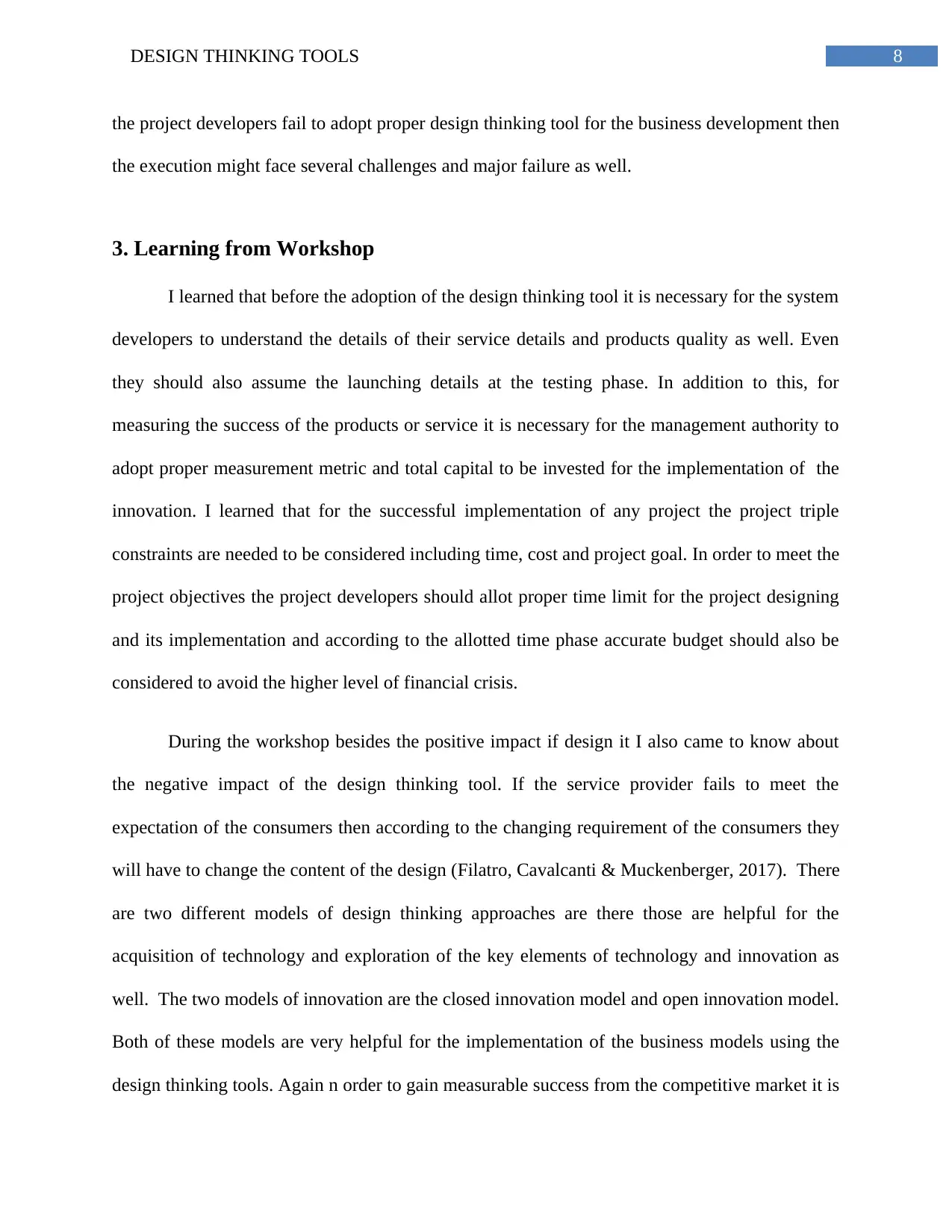
8DESIGN THINKING TOOLS
the project developers fail to adopt proper design thinking tool for the business development then
the execution might face several challenges and major failure as well.
3. Learning from Workshop
I learned that before the adoption of the design thinking tool it is necessary for the system
developers to understand the details of their service details and products quality as well. Even
they should also assume the launching details at the testing phase. In addition to this, for
measuring the success of the products or service it is necessary for the management authority to
adopt proper measurement metric and total capital to be invested for the implementation of the
innovation. I learned that for the successful implementation of any project the project triple
constraints are needed to be considered including time, cost and project goal. In order to meet the
project objectives the project developers should allot proper time limit for the project designing
and its implementation and according to the allotted time phase accurate budget should also be
considered to avoid the higher level of financial crisis.
During the workshop besides the positive impact if design it I also came to know about
the negative impact of the design thinking tool. If the service provider fails to meet the
expectation of the consumers then according to the changing requirement of the consumers they
will have to change the content of the design (Filatro, Cavalcanti & Muckenberger, 2017). There
are two different models of design thinking approaches are there those are helpful for the
acquisition of technology and exploration of the key elements of technology and innovation as
well. The two models of innovation are the closed innovation model and open innovation model.
Both of these models are very helpful for the implementation of the business models using the
design thinking tools. Again n order to gain measurable success from the competitive market it is
the project developers fail to adopt proper design thinking tool for the business development then
the execution might face several challenges and major failure as well.
3. Learning from Workshop
I learned that before the adoption of the design thinking tool it is necessary for the system
developers to understand the details of their service details and products quality as well. Even
they should also assume the launching details at the testing phase. In addition to this, for
measuring the success of the products or service it is necessary for the management authority to
adopt proper measurement metric and total capital to be invested for the implementation of the
innovation. I learned that for the successful implementation of any project the project triple
constraints are needed to be considered including time, cost and project goal. In order to meet the
project objectives the project developers should allot proper time limit for the project designing
and its implementation and according to the allotted time phase accurate budget should also be
considered to avoid the higher level of financial crisis.
During the workshop besides the positive impact if design it I also came to know about
the negative impact of the design thinking tool. If the service provider fails to meet the
expectation of the consumers then according to the changing requirement of the consumers they
will have to change the content of the design (Filatro, Cavalcanti & Muckenberger, 2017). There
are two different models of design thinking approaches are there those are helpful for the
acquisition of technology and exploration of the key elements of technology and innovation as
well. The two models of innovation are the closed innovation model and open innovation model.
Both of these models are very helpful for the implementation of the business models using the
design thinking tools. Again n order to gain measurable success from the competitive market it is
⊘ This is a preview!⊘
Do you want full access?
Subscribe today to unlock all pages.

Trusted by 1+ million students worldwide
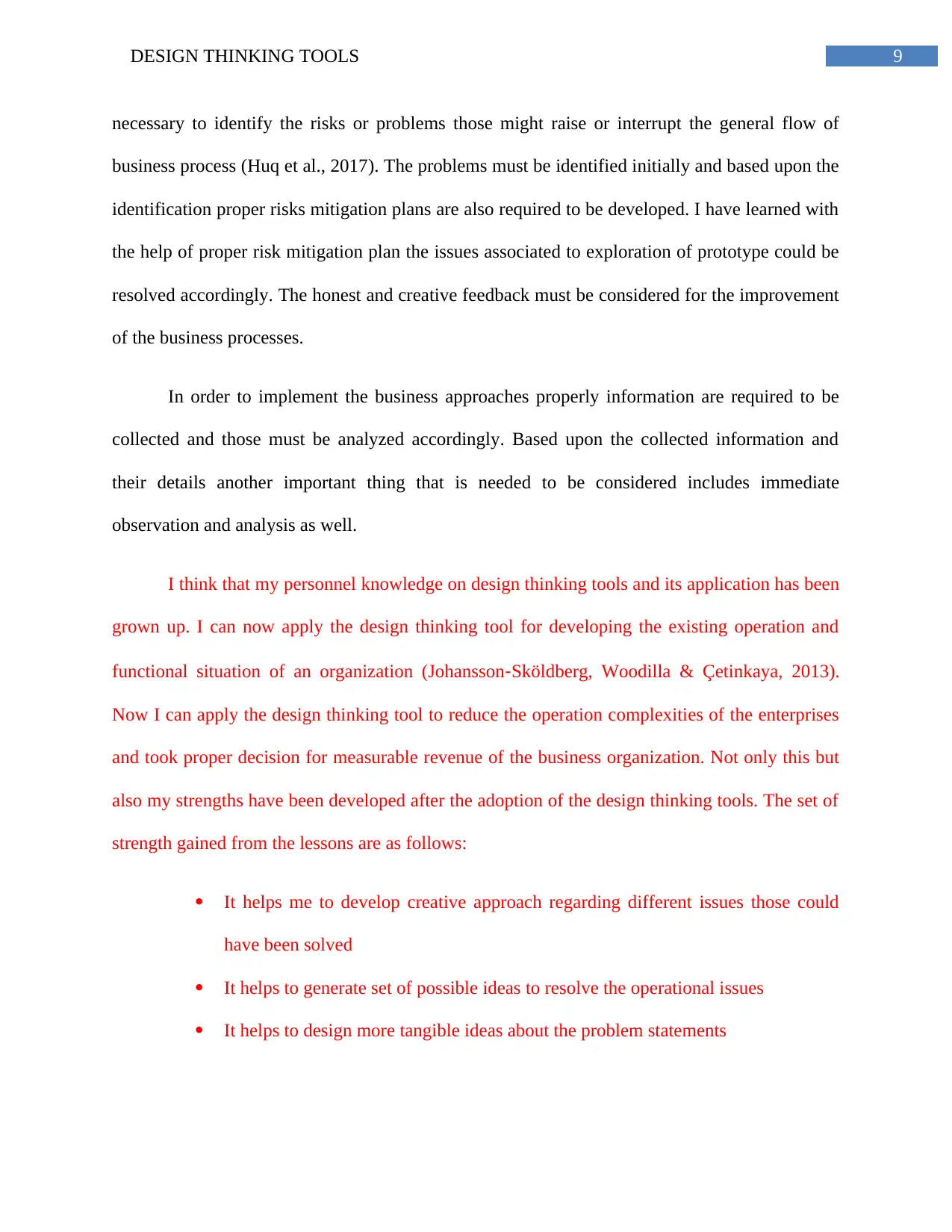
9DESIGN THINKING TOOLS
necessary to identify the risks or problems those might raise or interrupt the general flow of
business process (Huq et al., 2017). The problems must be identified initially and based upon the
identification proper risks mitigation plans are also required to be developed. I have learned with
the help of proper risk mitigation plan the issues associated to exploration of prototype could be
resolved accordingly. The honest and creative feedback must be considered for the improvement
of the business processes.
In order to implement the business approaches properly information are required to be
collected and those must be analyzed accordingly. Based upon the collected information and
their details another important thing that is needed to be considered includes immediate
observation and analysis as well.
I think that my personnel knowledge on design thinking tools and its application has been
grown up. I can now apply the design thinking tool for developing the existing operation and
functional situation of an organization (Johansson‐Sköldberg, Woodilla & Çetinkaya, 2013).
Now I can apply the design thinking tool to reduce the operation complexities of the enterprises
and took proper decision for measurable revenue of the business organization. Not only this but
also my strengths have been developed after the adoption of the design thinking tools. The set of
strength gained from the lessons are as follows:
It helps me to develop creative approach regarding different issues those could
have been solved
It helps to generate set of possible ideas to resolve the operational issues
It helps to design more tangible ideas about the problem statements
necessary to identify the risks or problems those might raise or interrupt the general flow of
business process (Huq et al., 2017). The problems must be identified initially and based upon the
identification proper risks mitigation plans are also required to be developed. I have learned with
the help of proper risk mitigation plan the issues associated to exploration of prototype could be
resolved accordingly. The honest and creative feedback must be considered for the improvement
of the business processes.
In order to implement the business approaches properly information are required to be
collected and those must be analyzed accordingly. Based upon the collected information and
their details another important thing that is needed to be considered includes immediate
observation and analysis as well.
I think that my personnel knowledge on design thinking tools and its application has been
grown up. I can now apply the design thinking tool for developing the existing operation and
functional situation of an organization (Johansson‐Sköldberg, Woodilla & Çetinkaya, 2013).
Now I can apply the design thinking tool to reduce the operation complexities of the enterprises
and took proper decision for measurable revenue of the business organization. Not only this but
also my strengths have been developed after the adoption of the design thinking tools. The set of
strength gained from the lessons are as follows:
It helps me to develop creative approach regarding different issues those could
have been solved
It helps to generate set of possible ideas to resolve the operational issues
It helps to design more tangible ideas about the problem statements
Paraphrase This Document
Need a fresh take? Get an instant paraphrase of this document with our AI Paraphraser
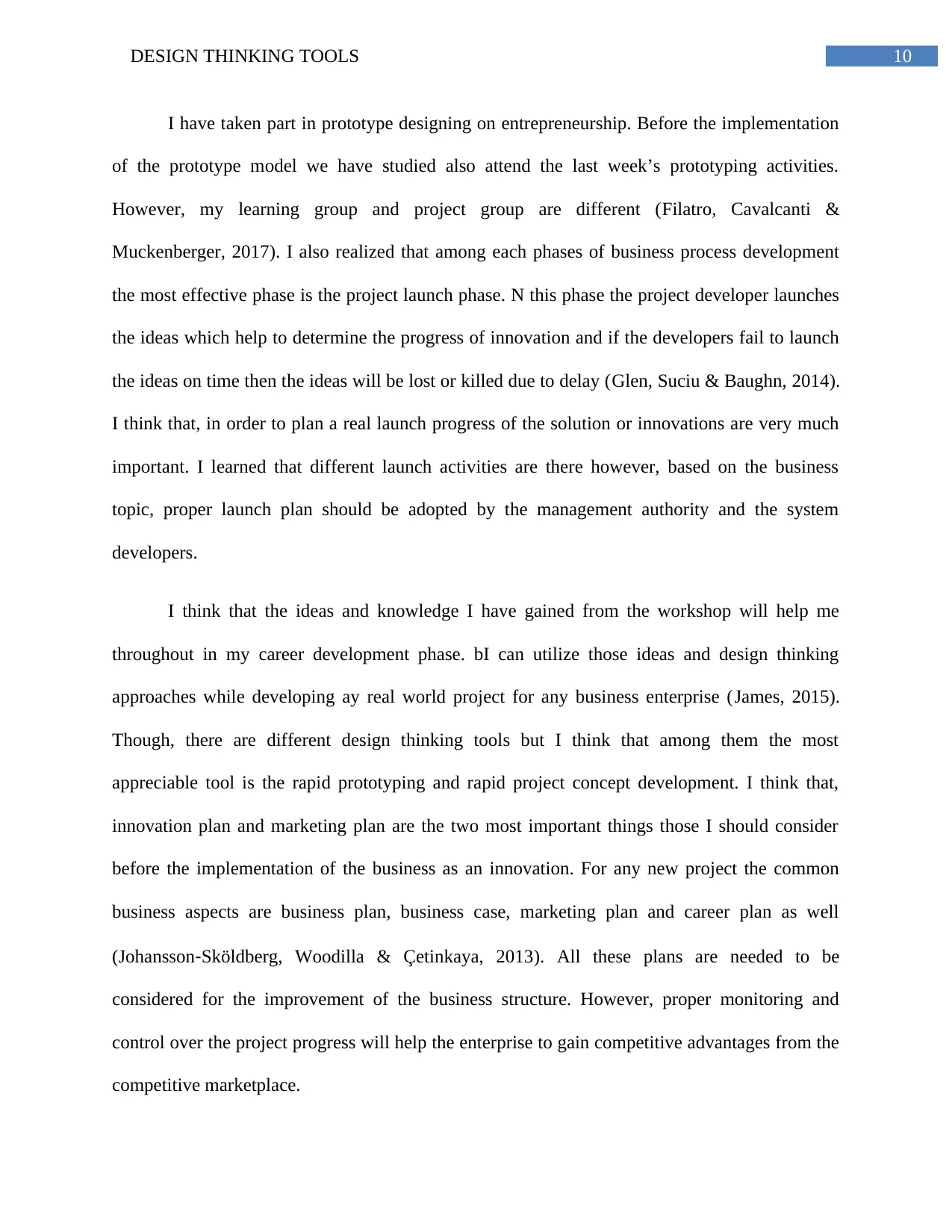
10DESIGN THINKING TOOLS
I have taken part in prototype designing on entrepreneurship. Before the implementation
of the prototype model we have studied also attend the last week’s prototyping activities.
However, my learning group and project group are different (Filatro, Cavalcanti &
Muckenberger, 2017). I also realized that among each phases of business process development
the most effective phase is the project launch phase. N this phase the project developer launches
the ideas which help to determine the progress of innovation and if the developers fail to launch
the ideas on time then the ideas will be lost or killed due to delay (Glen, Suciu & Baughn, 2014).
I think that, in order to plan a real launch progress of the solution or innovations are very much
important. I learned that different launch activities are there however, based on the business
topic, proper launch plan should be adopted by the management authority and the system
developers.
I think that the ideas and knowledge I have gained from the workshop will help me
throughout in my career development phase. bI can utilize those ideas and design thinking
approaches while developing ay real world project for any business enterprise (James, 2015).
Though, there are different design thinking tools but I think that among them the most
appreciable tool is the rapid prototyping and rapid project concept development. I think that,
innovation plan and marketing plan are the two most important things those I should consider
before the implementation of the business as an innovation. For any new project the common
business aspects are business plan, business case, marketing plan and career plan as well
(Johansson‐Sköldberg, Woodilla & Çetinkaya, 2013). All these plans are needed to be
considered for the improvement of the business structure. However, proper monitoring and
control over the project progress will help the enterprise to gain competitive advantages from the
competitive marketplace.
I have taken part in prototype designing on entrepreneurship. Before the implementation
of the prototype model we have studied also attend the last week’s prototyping activities.
However, my learning group and project group are different (Filatro, Cavalcanti &
Muckenberger, 2017). I also realized that among each phases of business process development
the most effective phase is the project launch phase. N this phase the project developer launches
the ideas which help to determine the progress of innovation and if the developers fail to launch
the ideas on time then the ideas will be lost or killed due to delay (Glen, Suciu & Baughn, 2014).
I think that, in order to plan a real launch progress of the solution or innovations are very much
important. I learned that different launch activities are there however, based on the business
topic, proper launch plan should be adopted by the management authority and the system
developers.
I think that the ideas and knowledge I have gained from the workshop will help me
throughout in my career development phase. bI can utilize those ideas and design thinking
approaches while developing ay real world project for any business enterprise (James, 2015).
Though, there are different design thinking tools but I think that among them the most
appreciable tool is the rapid prototyping and rapid project concept development. I think that,
innovation plan and marketing plan are the two most important things those I should consider
before the implementation of the business as an innovation. For any new project the common
business aspects are business plan, business case, marketing plan and career plan as well
(Johansson‐Sköldberg, Woodilla & Çetinkaya, 2013). All these plans are needed to be
considered for the improvement of the business structure. However, proper monitoring and
control over the project progress will help the enterprise to gain competitive advantages from the
competitive marketplace.
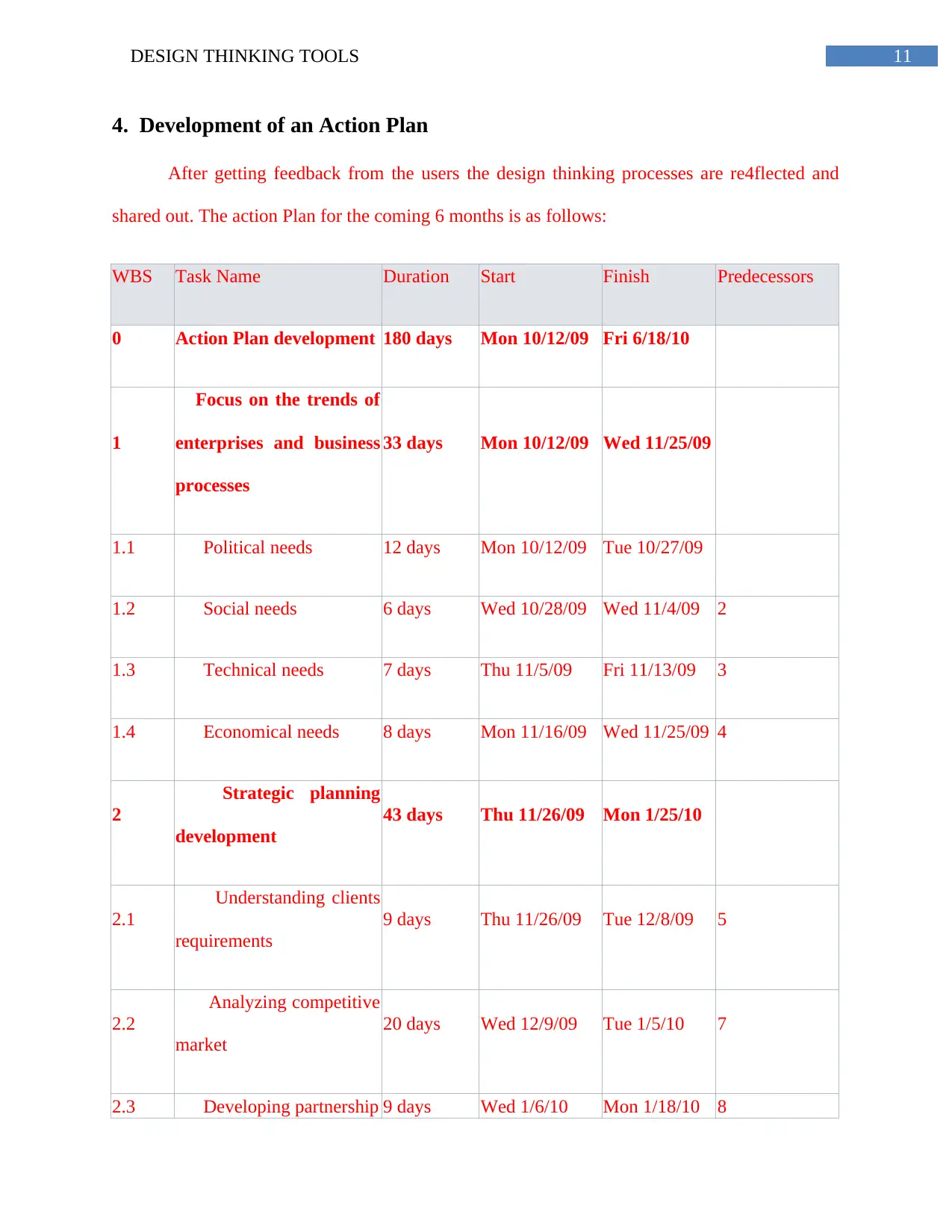
11DESIGN THINKING TOOLS
4. Development of an Action Plan
After getting feedback from the users the design thinking processes are re4flected and
shared out. The action Plan for the coming 6 months is as follows:
WBS Task Name Duration Start Finish Predecessors
0 Action Plan development 180 days Mon 10/12/09 Fri 6/18/10
1
Focus on the trends of
enterprises and business
processes
33 days Mon 10/12/09 Wed 11/25/09
1.1 Political needs 12 days Mon 10/12/09 Tue 10/27/09
1.2 Social needs 6 days Wed 10/28/09 Wed 11/4/09 2
1.3 Technical needs 7 days Thu 11/5/09 Fri 11/13/09 3
1.4 Economical needs 8 days Mon 11/16/09 Wed 11/25/09 4
2
Strategic planning
development
43 days Thu 11/26/09 Mon 1/25/10
2.1
Understanding clients
requirements
9 days Thu 11/26/09 Tue 12/8/09 5
2.2
Analyzing competitive
market
20 days Wed 12/9/09 Tue 1/5/10 7
2.3 Developing partnership 9 days Wed 1/6/10 Mon 1/18/10 8
4. Development of an Action Plan
After getting feedback from the users the design thinking processes are re4flected and
shared out. The action Plan for the coming 6 months is as follows:
WBS Task Name Duration Start Finish Predecessors
0 Action Plan development 180 days Mon 10/12/09 Fri 6/18/10
1
Focus on the trends of
enterprises and business
processes
33 days Mon 10/12/09 Wed 11/25/09
1.1 Political needs 12 days Mon 10/12/09 Tue 10/27/09
1.2 Social needs 6 days Wed 10/28/09 Wed 11/4/09 2
1.3 Technical needs 7 days Thu 11/5/09 Fri 11/13/09 3
1.4 Economical needs 8 days Mon 11/16/09 Wed 11/25/09 4
2
Strategic planning
development
43 days Thu 11/26/09 Mon 1/25/10
2.1
Understanding clients
requirements
9 days Thu 11/26/09 Tue 12/8/09 5
2.2
Analyzing competitive
market
20 days Wed 12/9/09 Tue 1/5/10 7
2.3 Developing partnership 9 days Wed 1/6/10 Mon 1/18/10 8
⊘ This is a preview!⊘
Do you want full access?
Subscribe today to unlock all pages.

Trusted by 1+ million students worldwide
1 out of 19
Related Documents
Your All-in-One AI-Powered Toolkit for Academic Success.
+13062052269
info@desklib.com
Available 24*7 on WhatsApp / Email
![[object Object]](/_next/static/media/star-bottom.7253800d.svg)
Unlock your academic potential
Copyright © 2020–2026 A2Z Services. All Rights Reserved. Developed and managed by ZUCOL.




